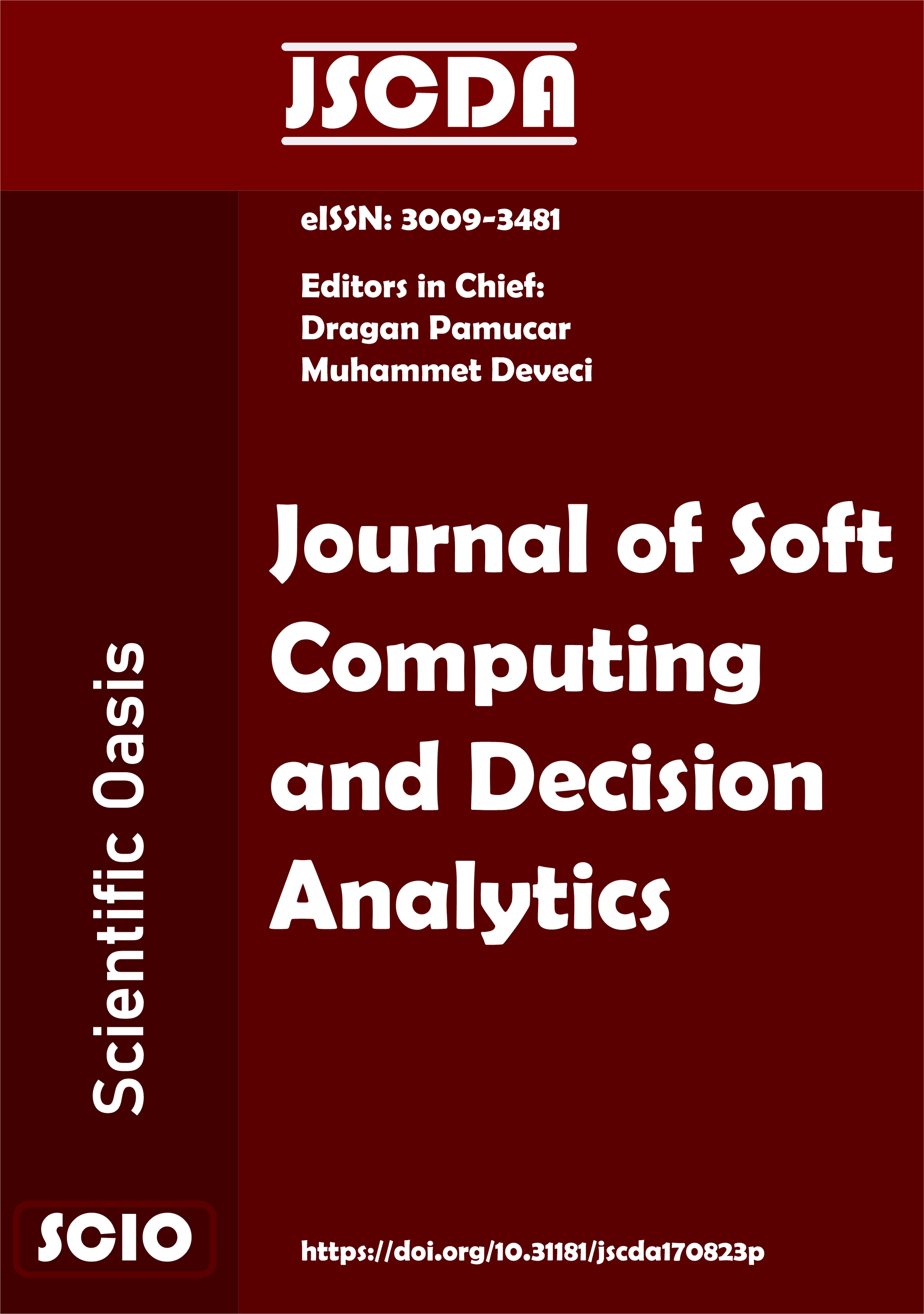A Comprehensive Evaluation Model for Smart Supply Chain Based on The Hybrid Multi-Criteria Decision-Making Method
DOI:
https://doi.org/10.31181/jscda11202313Keywords:
Smart supply chain, Assessment model, Group-based multi-criteria decision making, Best-worst method, VIKORAbstract
Enhancing the smartness of the supply chain under the influence of information technology development at different levels can have a significant effect on its overall performance and a favorable response to the continuous changes in the business environment in the wide network of local and global supply chains. Therefore, in this study, the important and influential aspects of supply chain smartness have been investigated via a comprehensive assessment model. Then, evaluation criteria are prioritized using the new combined multi-criteria decision-making method. For this purpose, the supply chain of Iran Khodro Company has been considered as a case study. The identification and selection of assessment criteria are based on the literature review and experts' opinions via the Delphi method. Then, by using the developed best-worst group fuzzy method, the final prioritization of the criteria has been proposed. Finally, the evaluation of smartness improvement solutions is proposed by using the Vikor method. The main obtained results indicate the importance of cost, technology, security, customer relationship management, and agility criteria.
References
Afshari, H., Jaber, M. Y., & Searcy, C. (2019). Investigating the effects of learning and forgetting on the feasibility of adopting additive manufacturing in supply chains. Computers & Industrial Engineering, 128, 576-590. https://doi.org/10.1016/j.cie.2018.12.069
Aghakhani Bezdi Langari, A., & Hasani, A. (2023). Customer Churn Analysis Based on The Datamining Approach: Hybrid Algorithm Incorporates Decision Tree and Bayesian Network. New Marketing Research Journal. https://doi.org/10.22108/NMRJ.2023.135756.2797
Akhtar, M. (2022). Industry 4.0 Technologies Impact on Supply Chain Sustainability. https://doi.org/10.5772/intechopen.102978
Aliahmadi, A., Nozari, H., & Ghahremani-Nahr, J. (2022). AIoT-based sustainable smart supply chain framework. International journal of innovation in management, economics and social sciences, 2(2), 28-38. https://doi.org/10.52547/ijimes.2.2.28
Bonab, S. R., Haseli, G., Rajabzadeh, H., Ghoushchi, S. J., Hajiaghaei-Keshteli, M., & Tomaskova, H. (2023). Sustainable resilient supplier selection for IoT implementation based on the integrated BWM and TRUST under spherical fuzzy sets. Decision making: applications in management and engineering, 6(1), 153-185. https://doi.org/10.31181/dmame12012023b.
Butner, K. (2010). The smarter supply chain of the future. Strategy & Leadership, 38(1), 22-31. https://doi.org/10.1108/10878571011009859
Da Silva, V. L., Kovaleski, J. L., & Pagani, R. N. (2019). Technology transfer in the supply chain oriented to industry 4.0: a literature review. Technology Analysis & Strategic Management, 31(5), 546-562. https://doi.org/10.1080/09537325.2018.1524135
Dallasega, P., Woschank, M., Zsifkovits, H., Tippayawong, K., & Brown, C. A. (2020). Requirement analysis for the design of smart logistics in SMEs. Industry 4.0 for SMEs: Challenges, opportunities and requirements, 147-162.
Ditizio, A. A., & Smith, A. D. (2017). Transformation of CRM and Supply Chain Management Techniques in a New Venture. In Organizational Productivity and Performance Measurements Using Predictive Modeling and Analytics (pp. 96-114). IGI Global. https://doi.org/10.40 18/978-1-5225-0654-6.ch006
Hasani, A. (2021). Resilience cloud-based global supply chain network design under uncertainty: Resource-based approach. Computers & Industrial Engineering, 158, 107382. https://doi.org/10.1016/j.cie.2021.107382
Hasani, A. (2021). Resilience cloud-based global supply chain network design under uncertainty: Resource-based approach. Computers & Industrial Engineering, 158, 107382. https://doi.org/10.1016/j.cie.2021.107382
Hasani, A., & Sheikh, R. (2023). Robust goal programming approach for healthcare network management for perishable products under disruption. Applied Mathematical Modelling, 117, 399-416. https://doi.org/10.1016/j.apm.2022.12.021
Haseli, G., Ranjbarzadeh, R., Hajiaghaei-Keshteli, M., Ghoushchi, S. J., Hasani, A., Deveci, M., & Ding, W. (2023). HECON: Weight assessment of the product loyalty criteria considering the customer decision's halo effect using the convolutional neural networks. Information Sciences, 623, 184-205. https://doi.org/10.1016/j.ins.2022.12.027
Haseli, G., Sheikh, R., & Sana, S. S. (2020). Base-criterion on multi-criteria decision-making method and its applications. International journal of management science and engineering management, 15(2), 79-88. https://doi.org/10.1080/17509653.2019.1633964.
Haseli, G., Sheikh, R., Wang, J., Tomaskova, H., & Tirkolaee, E. B. (2021). A novel approach for group decision making based on the best–worst method (G-bwm): Application to supply chain management. Mathematics, 9(16), 1881. https://doi.org/10.3390/math9161881.
Haseli, G., Torkayesh, A. E., Hajiaghaei-Keshteli, M., & Venghaus, S. (2023). Sustainable resilient recycling partner selection for urban waste management: Consolidating perspectives of decision-makers and experts. Applied Soft Computing, 137, 110120. https://doi.org/10.1016/j.asoc.2023.110120.
Lee, H. L. (2004). The triple-A supply chain. Harvard business review, 82(10), 102-113.
Lin, L. C. (2009). An integrated framework for the development of radio frequency identification technology in the logistics and supply chain management. Computers & Industrial Engineering, 57(3), 832-842. https://doi.org/10.1016/j.cie.2009.02.010.
Liu, H., Lu, F., Shi, B., Hu, Y., & Li, M. (2023). Big data and supply chain resilience: role of decision-making technology. Management Decision. https://doi.org/10.1108/MD-12-2021-1624
Ma, J., Zhang, D., Dong, J., & Tu, Y. (2020). A supply chain network economic model with time-based competition. European Journal of Operational Research, 280(3), 889-908. https://doi.org/10.1016/j.ejor.2019.07.063
Manavalan, E., & Jayakrishna, K. (2019). A review of Internet of Things (IoT) embedded sustainable supply chain for industry 4.0 requirements. Computers & industrial engineering, 127, 925-953. https://doi.org/10.1016/j.cie.2018.11.030
Marinagi, C., Reklitis, P., Trivellas, P., & Sakas, D. (2023). The Impact of Industry 4.0 Technologies on Key Performance Indicators for a Resilient Supply Chain 4.0. Sustainability, 15(6), 5185. https://doi.org/10.52547/ijimes.2.2.28
Nozari, H., & Edalatpanah, S. A. (2023). Smart Systems Risk Management in IoT-Based Supply Chain. In Advances in Reliability, Failure and Risk Analysis (pp. 251-268). Singapore: Springer Nature Singapore.
Petrudi, S. H. H., Tavana, M., & Abdi, M. (2020). A comprehensive framework for analyzing challenges in humanitarian supply chain management: A case study of the Iranian Red Crescent Society. International Journal of disaster risk reduction, 42, 101340. https://doi.org/10.1016/j.ijdrr.2019.101340
Samsamian, S., Hasani, A., Hakak, S., Esmaeilnezhad, T. F., & Khan, M. K. (2023). Comprehensive risk assessment and analysis of block chain technology implementation using fuzzy cognitive mapping. Computer Science and Information Systems, 20(3), 977-996. https://doi.org/10.2298/CSIS220308039S
Samsamian, S., Hasani, A., Hakak, S., Esmaeilnezhad, T. F., & Khan, M. K. (2023). Comprehensive risk assessment and analysis of blockchain technology implementation using fuzzy cognitive mapping. Computer Science and Information Systems, (00), 39-39. https://doi.org/10.2298/CSIS220308039S.
Schwab, K. (2017). The fourth industrial revolution. Currency.
Sharma, P., & Dash, B. (2023). Smart SCM Using AI and Microsoft 365. International Journal of Advanced Research in Computer and Communication Engineering, 12(1), 44-54. https://doi.org/10.17148/IJARCCE.2023.12106
Szozda, N. (2017). Industry 4.0 and its impact on the functioning of supply chains. Logforum, 13(4).
https://doi.org/10.17270/J.LOG.2017.4.2
Tanha, F. E., Hasani, A., Hakak, S., & Gadekallu, T. R. (2022). Blockchain-based cyber physical systems: Comprehensive model for challenge assessment. Computers and Electrical Engineering, 103, 108347. https://doi.org/10.1016/j.compeleceng.2022.108347
Tanha, F. E., Hasani, A., Hakak, S., & Gadekallu, T. R. (2022). Blockchain-based cyber physical systems: Comprehensive model for challenge assessment. Computers and Electrical Engineering, 103, 108347. https://doi.org/10.1016/j.compeleceng.2022.108347.
Wu, Y., & Wu, Y. (2019). Introduction: The Phenomenon of Supply Chain Agility. Achieving Supply Chain Agility: Information System Integration in the Chinese Automotive Industry, 1-10. https://www.mckinsey.com/industries/consumer-packaged-goods/our-insights/supply-chain-4-0-in-consumer-goods
Zhang, C., Ma, S., Wang, M., Hinz, G., & Knoll, A. (2022, October). Efficient POMDP Behavior Planning for Autonomous Driving in Dense Urban Environments using Multi-Step Occupancy Grid Maps. In 2022 IEEE 25th International Conference on Intelligent Transportation Systems (ITSC) (pp. 2722-2729). IEEE. https://doi.org/10.1109/ITSC55140.2022.9922353
Downloads
Published
Issue
Section
License
Copyright (c) 2023 Scientific Oasis

This work is licensed under a Creative Commons Attribution-NonCommercial-NoDerivatives 4.0 International License.
















